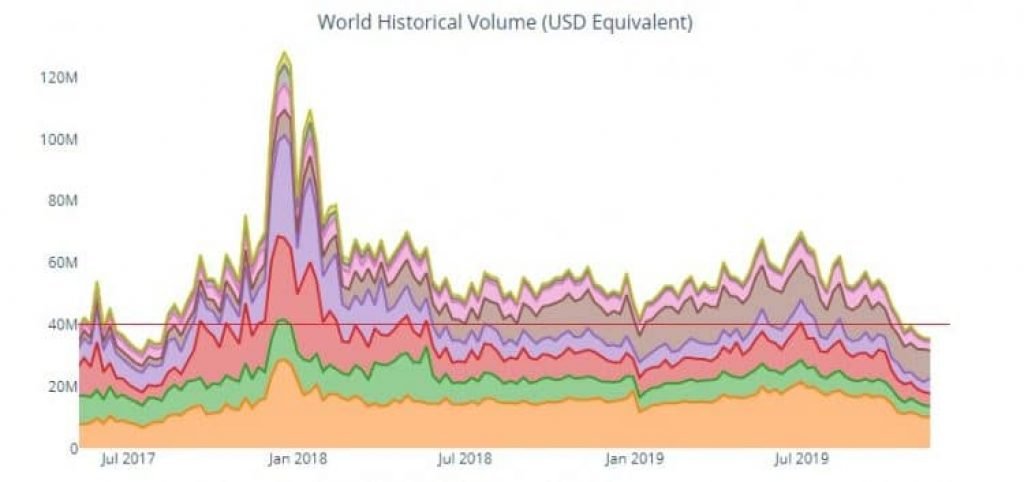
- At its highest point this year, the platform moved over USD 70,000,000 in one week.
- Increased personal data required by the platform could influence the decline.
Bitcoin (BTC) trades through the LocalBitcoins platform have fallen to their lowest levels since August 2017. Weekly trading figures in USD since mid-October 2019 are below USD 40,000,000. This is evidenced by data from the peer-to-peer trading platform published on usefultulips.org.
These trade numbers have not been seen since mid-2017, months before the bitcoin price reached an all-time high, touching USD 20,000 per coin. UsefulTulips, which tracks trades on LocalBitcoins, shows the decline in the total value of trades per week on that platform. To do this, it uses data supplied by LocalBitcoins itself, through its public API.
At the end of June, the platform reached its weekly trade peak of the year. During that last week of the month, LocalBitcoins users traded a total of USD 70,144,091 in BTCs. In the week ending Sunday, November 17, 2019, LocalBitcoins users traded USD 35,442,271. The drop is almost 50% between the two periods.

The drop in trading levels at LocalBitcoins globally is also reflected in local markets. In particular, the Venezuelan market has been falling in terms of its volume in BTC or USD, despite the fact that the devaluation of the Venezuelan currency generates continuous increases in the historical trading highs in that currency, the bolivar.
What has changed?
Among the possible reasons for the fall in trade volumes in one of the most used exchange platforms in the bitcoin ecosystem, stands out an increase in the personal information requirements of its users.
During this year, the platform has updated its “Know your Customer” (KYC) policy, according to which users must provide more and more data to be able to trade normally.
In July 2019, LocalBitcoins announced through its official blog the activation of a deadline for its customers to adhere to the new account verification regulations. If users did not update their data before September 1, their accounts would be disabled, the statement warned.
Another new feature that could influence is the removal of the option for users to exchange bitcoins for cash in person. This possibility of physical exchanges mediated by the platform was deactivated in early June, without further explanation. However, a couple of days after the announcement, LocalBitcoins made a statement on the matter, claiming to have had to comply with regulations on money laundering and terrorist financing in Finland, where the platform has its institutional headquarters.
Competition Grows
While numbers are clearly decreasing at LocalBitcoins, other P2P exchange platforms present in the ecosystem are flourishing. For example, data from coin.dance reflects a sustained increase in the Paxful platform.
At that site, the barrier of USD 25,000,000 per week was surpassed for the first time in late September 2019. In fact, the week of 9 November marked a new high for the platform of over USD 27,000,000.
Another platform that is being launched as a LocalBitcoins competition is LocalEthereum. The exchange site, originally dedicated exclusively to ETH trading, will now be dedicated to the exchange of bitcoin and other crypto currencies. The new platform, now called LocalCryptos, began including bitcoin in its exchange offering.
Among the main attractions offered by LocalCryptos is a non-custodial system, in which the user controls his private keys. It does not have KYC either, so users’ personal information will be private. In addition, those who choose to migrate to LocalCryptos will be able to maintain their reputation from LocalBitcoins, an advantage for merchants who have developed good reputation within that platform.




